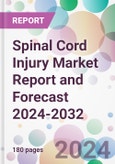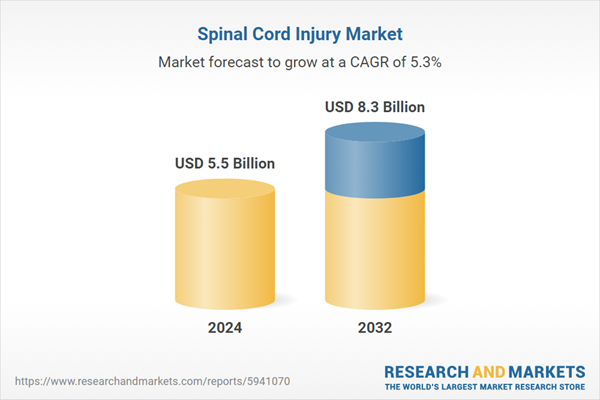Spinal Cord Injury Market Outlook
The spinal cord injury market size was valued at USD 5.2 billion in 2023, driven by rising incidence of injuries. The market size is anticipated to grow at a CAGR of 5.3% during the forecast period of 2024-2032 to achieve a value of USD 8.3 billion by 2032.Spinal Cord Injury: Introduction
Spinal cord injury (SCI) involves damage to the spinal cord that results in a loss of function, such as mobility or sensation. The severity depends on the location and extent of the injury. SCIs can be traumatic, caused by accidents or violence, or non-traumatic, due to diseases or degeneration. Symptoms vary but can include paralysis, loss of sensation, and dysfunction in bodily systems. Treatment focuses on preventing further injury and enabling patients to live independently.Key Trends in the Spinal Cord Injury Market
There's growing awareness about the benefits of early treatment for spinal cord injuries, which is driving the market forward. Prompt intervention is recognized for improving outcomes and reducing long-term complications.The market is also being fueled by an increasing incidence of spinal cord injuries. Factors contributing to this rise include road accidents, falls, and sports injuries. The growing popularity of extreme sports activities across the globe is also noted as a contributing factor to the increased incidence of acute spinal cord injuries.
Advancements in medical technology are playing a crucial role in the treatment and rehabilitation of spinal cord injuries. Innovative treatments and rehabilitation techniques are improving outcomes and quality of life for patients.
There's a growing focus on not just acute care but also on the long-term rehabilitation and support for spinal cord injury patients. This includes physical therapy, occupational therapy, and the use of assistive devices to enhance mobility and independence.
Similar to other healthcare sectors, the spinal cord injury market is also witnessing the integration of digital health solutions. This includes tele-rehabilitation, remote monitoring, and the use of apps and platforms for patient support and community building.
Spinal Cord Injury Market Segmentation
Market Breakup by Injury Type
- Complete Spinal Cord Injury
- Incomplete Spinal Cord Injury
Market Breakup by Treatment Type
- Corticosteroid
- Surgery
- Spinal Traction
Market Breakup by End User
- Hospitals
- Clinics
- Others
Market Breakup by Region
- United States
- EU-4 and the United Kingdom
- Germany
- France
- Italy
- Spain
- United Kingdom
- Japan
Spinal Cord Injury Market Overview
North America is often seen as a leader in spinal cord injury treatment and research, primarily due to substantial investments in healthcare infrastructure and research facilities. The region has a strong presence of key market players who invest heavily in R&D activities, leading to innovative treatment options and rehabilitation technologies. There is also a robust regulatory framework that supports the introduction and adoption of new therapies. Awareness campaigns and fundraising activities by non-profit organizations further contribute to a supportive environment for spinal cord injury patients.Europe shows a strong commitment to spinal cord injury management through its well-developed healthcare systems and government-funded health services. The region is known for its rigorous research activities, with numerous collaborations between academic institutions and the healthcare industry. These efforts are often supported by substantial funding from government bodies and private entities. European regulations, while strict, are aimed at ensuring the safety and efficacy of spinal cord injury treatments, facilitating the introduction of advanced therapies in the market.
Japan is witnessing significant growth in the spinal cord injury market, driven by increasing healthcare expenditure and a growing awareness of advanced treatment options. Country is rapidly modernizing their healthcare infrastructure and investing in medical research. The region also benefits from a large patient pool and increasing government initiatives aimed at improving healthcare accessibility. However, the market is quite diverse, with varying levels of healthcare infrastructure and access to treatment options across different countries.
Spinal Cord Injury Market: Competitor Landscape
The key features of the market report include patent analysis, grants analysis, clinical trials analysis, funding and investment analysis, partnerships, and collaborations analysis by the leading key players.- Novartis AG
- Tenax Therapeutics
- Accure Pharma
- Acorda Therapeutics
- Asterias Biotherapeutics
- ReNetX Bio.
- BioArctic AB
- BioTime, Inc
- InVivo Therapeutics
- Kringle Pharma
This product will be delivered within 5-7 business days.
Table of Contents
Companies Mentioned
- Novartis AG
- Tenax Therapeutics
- Accure Pharma
- Acorda Therapeutics
- Asterias Biotherapeutics
- ReNetX Bio.
- BioArctic AB
- BioTime Inc
- InVivo Therapeutics
- Dr. Reddy's Laboratories Ltd.
- Zydus Cadila
- AbbVie Inc.
- Vertex Pharmaceuticals Inc.
- Pfizer Inc.
- Kringle Pharma
Table Information
| Report Attribute | Details |
|---|---|
| No. of Pages | 180 |
| Published | February 2024 |
| Forecast Period | 2024 - 2032 |
| Estimated Market Value ( USD | $ 5.5 Billion |
| Forecasted Market Value ( USD | $ 8.3 Billion |
| Compound Annual Growth Rate | 5.3% |
| Regions Covered | Global |
| No. of Companies Mentioned | 15 |









